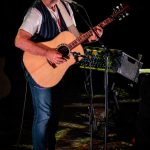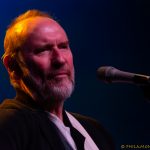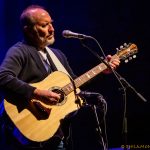Live Review and Photo Gallery: Colin Hay at Thalia Hall • Chicago
Colin Hay at Thalia Hall, Chicago, IL
Saturday, March 26, 2022
Review by Jeff Elbel
Photos by Philamonjaro
Even more welcome to many music lovers than the first robin of spring is the return of Colin Hay to touring as a solo acoustic juggernaut. The erstwhile Men at Work bandleader is now well established as a captivating songsmith and performer under his own name, with 15 solo albums to his credit since 1987. Hay could easily take a step to the side and hold audiences’ attention as a stand-up comic or raconteur as well, but that would be a loss for fans of his rough-hewn but still-supple tenor and prodigious skill as a guitarist. In addition to his multiplatinum-selling and Grammy-winning pop pedigree, those assets have made Hay a coveted sideman playing Beatles songs for old his hero and friend Ringo Starr’s All-Starr Band through the peak touring season during the summer months.
After writing the title track for Starr’s 2019 album What’s My Name, Starr returned the favor by playing drums on the nostalgic and winsome title track to Hay’s latest LP Now and the Evermore. That song and other new confections were featured alongside old favorites during Saturday night’s return visit to Thalia Hall.
Hay danced his way into the spotlight, wearing blue jeans, a dark blazer, a striped vest, and an Eiffel Tower t-shirt. He immediately began cracking jokes about club-dancing stereotypes, but soon pivoted toward gratitude for being able to stand before a room full of his fans once again. “I’m going to try to distract you from a malevolent world for a couple of hours,” he said, recalling pandemic fears and inferring the current brutality in Ukraine. Hay recalled the ennui and isolation of covid lockdown that led to his 2021 covers album I Just Don’t Know What to Do with Myself. He then performed the title track, written by Burt Bacharach and Hal David and released as a single by Dusty Springfield in 1964. Hay’s own “Beautiful World” followed, described as an attempt to ritualize the simple things in life. “They’re often the best,” said Hay. Released on 2002’s Company of Strangers album, the song may not have been a chart-topper, but to Hay’s devoted crowd it was clearly a familiar favorite.
With its jaunty rockabilly bounce, Hay said he imagined the new song “A Man Without a Name” being sung by Elvis Presley and accompanied by the King of Rock and Roll’s signature hip-swinging poses. Hay drew cheers for demonstrating those steps during the song. Another new song “Starfish and Unicorns” was given emotional depth by Hay’s stories of returning to see his aging and beloved parents in Melbourne, Australia. He also described scattering his parents’ ashes with his brother and sister, connecting to imagery within the song’s picturesque and melancholy acoustic folk. “Maggie” was another evocative song based upon memories of Hay’s first love, a once-bright spark whose life unraveled and ended in tragedy.
The mood brightened with the title cut “Now and the Evermore” and Hay’s self-deprecating tales of interacting with Starr. Although Hay was a gracious host intent on fostering rapport with the crowd, he expected the courtesy to be returned. Before playing the song, Hay gently chastised a woman in the crowd who had been glued to her cell phone with the screen at full brightness. “I’m like a deer in the headlights,” he said, gaping wide-eyed in jest.
Soon after came a cover of another hero, when Hay performed Ray Davies’ pop masterpiece “Waterloo Sunset” by the Kinks. Hay described the experience of having the then-new song etched into memory at age 14. He heard it while crossing the gangplank onto the boat that would take his family on a four-week journey as they emigrated from Scotland to Australia.
Hay revealed a bit of his process when describing the origin of new character sketch “Agatha Bell.” Built around a nimble and catchy acoustic guitar riff, Hay said that he free-associated the name and then spent time pondering what the character was like. The song seems like the tale of a romantic but unlucky serial widow, but Hay revealed his creation’s shadowy secret. “She’s a killer,” he said.
Hay introduced the set’s first Men at Work chestnut with a story about his boyhood friend and bandmate Greg Ham, who famously played saxophone and flute for Men at Work’s best-known singles. Hay comically described trips taken by himself and Ham to the country, where they marveled at the intricacy of mundane nature under the influence of hallucinogenic mushrooms. Hay then described how the signature saxophone line to “Who Can it Be Now” began as a spookier guitar texture, like one that might be heard at a commercial break during TV’s Forensic Files. The familiar song’s performance was impressive for how effortlessly and agelessly Hay unfolded the melody and hit its stratospheric high notes. The same was soon shown to be true during “Overkill,” when Hay again demonstrated how impressively he had maintained his voice as his most unique instrument.
The Men at Work songs were undeniably fun, and Hay delighted at the background vocals sung in resonant harmony by the audience during the coda to “Who Can it Be Now.” For many, however, the proof of Hay’s staying power as a songwriter came with a spine-tingling performance of his nakedly emotional solo song “I Just Don’t Think I’ll Ever Get Over You,” which was featured on the Garden State soundtrack. The set closed with another moving gem from Hay’s solo catalog, “Waiting for My Real Life to Begin.” Hay described writing the song a year following the termination of his recording contract in 1990 when he wondered how long it would take to scale the heights of success once again. “I had to ask myself a serious question,” Hay said. “If I never get back to those lofty peaks ever again, is playing at Thalia Hall on a Saturday night in Chicago … is that going to be good enough?” Fans cheered in support.
“And I realized, it’s really not,” Hay deadpanned to much laughter, followed by his own. Clocking at two hours and five minutes, the show closed with the song Hay said had been the best to him over the past 40 years. After performing an intimate acoustic version of Men at Work’s international number-one single “Down Under,” Hay offered warm thanks to his fans and patrons. Flashing the peace sign, he turned and gave a spinning step as he danced his way into the wings.
Category: Featured, IE Photo Gallery, Live Reviews

















